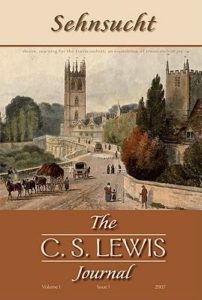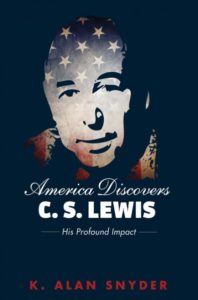 The new edition of Sehnsucht: The C. S. Lewis Journal has some marvelous articles, and tucked into the back of the journal in the book review section is a review of my recent offering, America Discovers C. S. Lewis: His Profound Impact.
The new edition of Sehnsucht: The C. S. Lewis Journal has some marvelous articles, and tucked into the back of the journal in the book review section is a review of my recent offering, America Discovers C. S. Lewis: His Profound Impact.
The review was undertaken by Lewis scholar Charlie Starr. It’s always nice when a reviewer catches the spirit of the book he is analyzing; Starr accomplishes that admirably when reporting on what I’ve written.
“We might ask,” Starr begins, “what else can be written about Lewis?” He continues, “One answer to that question: we can examine C. S. Lewis’s relationships with Americans and his influence on America. In revealing that answer, K. Alan Snyder does not disappoint.”
Words like that are a balm to an author’s soul.
Starr then asks the following: “If there is a test for ‘yet another’ book on Lewis, it is this question: does it teach the audience something new? Snyder’s book accomplishes that task throughout.”
Commenting on the chapter in which I detail the relationship between Lewis and his first biographer, Chad Walsh, Starr notes,
In this chapter, we also get what is one of the highlights running throughout Snyder’s book: an account of first impressions. Before meeting Lewis, Walsh’s image was of a “sad-eyed,” and “world-weary” man—an impression drawn from pictures of Lewis, and one which made no sense given the vibrancy and life Walsh found in Lewis’s books.
This mystery disappeared once Walsh met Lewis and he realized that the dust-jacket pictures resembled Lewis “as much as a mummy resembles a living man.”
 In my book, I offered a number of first impressions people had of Lewis. When one of his American students, William Brown Patterson, first saw Lewis, he didn’t know who he was, and since he was in “baggy trousers” and a “shapeless tweed jacket,” Patterson concluded this must be the gardener.
In my book, I offered a number of first impressions people had of Lewis. When one of his American students, William Brown Patterson, first saw Lewis, he didn’t know who he was, and since he was in “baggy trousers” and a “shapeless tweed jacket,” Patterson concluded this must be the gardener.
“The best moments in Snyder’s book,” Starr testifies, “are these storied moments, and the author manages the historian’s art: to tell a story of the past.”
One of my concerns was whether I could add anything new to the Lewis story. Starr believes I did, although he did point to one omission on my part:
In giving us the biographies of people influenced by Lewis, Snyder adds something to the biography of Lewis himself. Clyde Kilby’s story is worth knowing. Sheldon Vanauken’s account is one of the most powerful stories in the book (66-73), carrying much of the potency in this abbreviated telling that is to be found in Vanauken’s own account, A Severe Mercy.
Even more profound is the story of Joy Davidman Gresham, one which Snyder tells with charm and restraint, although the history here suffers from a failure to use the most recent discoveries about Joy and Lewis, particularly the love sonnets she wrote for him.
Mea culpa. May I plead ignorance?
Starr loves my Preface, which he says “grips readers and draws them in,” but feels I sometimes fall into basic (actually, the word he used was “bland”) prose. But he does give me a little bit of an “out” for that, noting that it’s kind of difficult to maintain the prose level of the Preface when all you are doing is providing an overview of the various Lewis societies and organizations.
He was impressed with the “excellent testimonies” from Americans who responded to my survey about how Lewis has impacted them. And he likes the chapter devoted to Lewis’s correspondence with ordinary Americans:
Here Snyder is smart to track down not only new and surprising stories about Lewis’s correspondents, but also the best tidbits from Lewis’s letters. The three-volume set of Lewis’s letters is a daunting read. Snyder kindly offers some fine moments from an epistolary Lewis in a few pages.
Starr’s final paragraph in the review summarizes nicely, so I give it here in full:
There are times when Lewis scholars and fans should ask, “Is this new book about Lewis really needed?” It would be very easy to ask whether or not we need a book about Lewis and America, especially one that moves beyond Lewis and his generation to the generations after. However, K. Alan Snyder’s America Discovers C. S. Lewis illustrates the first foray into something very much worthwhile. Snyder’s book predicts about Lewis what usually takes centuries to recognize in philosophers, theologians, or poets: the need to look back, acknowledge, and analyze the profound influence of a great writer/thinker on our culture. Had Lewis faded in the sixties as he himself predicted, there would be no need for such a study. Yet, despite Lewis’s speculation, Snyder firmly demonstrates a powerful trend: C. S. Lewis has and still is influencing Christianity in America. He did so in his lifetime, and, as Snyder proves, he continues to do so today.
I’m grateful to Charlie Starr for this positive review. Need I say that I hope it may inspire those who read it to make my book part of their collection?
